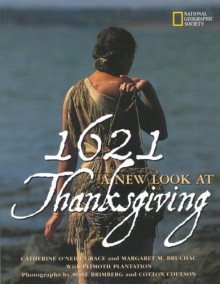In cooperation with the Plimoth Plantation, a living-history museum in Massachusetts, National Geographic has recreated the first Thanksgiving. Photographs by National Geographic photographers of the recreation at Plimoth Plantation illustrate this book. In 1621, in a small settlement on the...
show more
In cooperation with the Plimoth Plantation, a living-history museum in Massachusetts, National Geographic has recreated the first Thanksgiving. Photographs by National Geographic photographers of the recreation at Plimoth Plantation illustrate this book. In 1621, in a small settlement on the edge of the sea, 52 English colonists celebrated their first harvest. The colonists were joined by 90 men of the Wampanoag tribe for a gathering that was to last three days in a town now known as Plymouth. Over the centuries, there have been countless versions of this story, creating a popular myth of the first Thanksgiving. Many Americans imagine brave, peaceful settlers inviting a few wild Indians over for a turkey dinner. But there was no pumpkin pie or cranberry sauce at this celebration. There were no Indians with woven blankets over their shoulders and large feathered headdresses. No pilgrims with somber black clothes and silver buckle hats either. The English didn't even call themselves Pilgrims. This book puts aside that myth and takes a new look at our American history. It questions what we know and recovers lost voices of the Wampanoag people. True history includes the voices of all its participants. 1621: A New Look at Thanksgiving invites young people to read, listen, and think about our shared history. The book also features a foreword, a section on the actual reenactment and the concept of living history, a chronology, an index, and a bibliography.
show less

